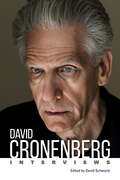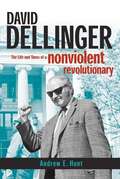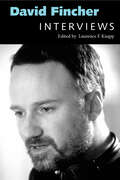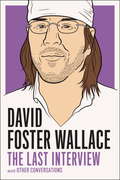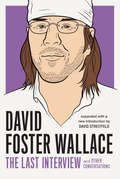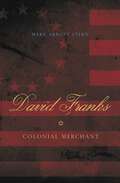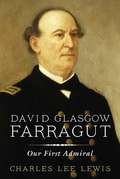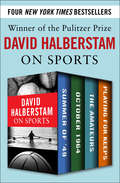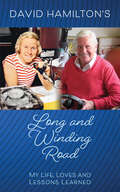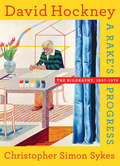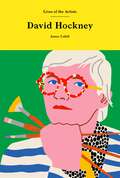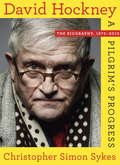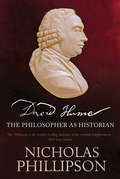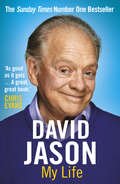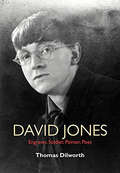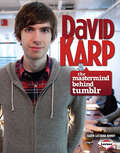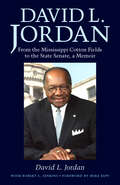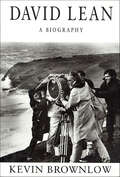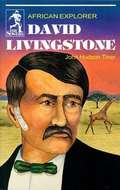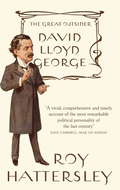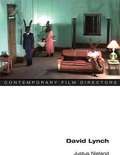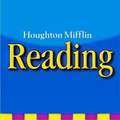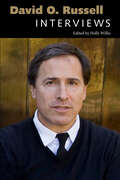- Table View
- List View
David Cronenberg: Interviews (Conversations with Filmmakers Series)
by David SchwartzFrom his early horror movies, including Scanners, Videodrome, Rabid, and The Fly—with their exploding heads, mutating sex organs, rampaging parasites, and scientists turning into insects—to his inventive adaptations of books by William Burroughs (Naked Lunch), Don DeLillo (Cosmopolis), and Bruce Wagner (Maps to the Stars), Canadian director David Cronenberg (b. 1943) has consistently dramatized the struggle between the aspirations of the mind and the messy realities of the flesh. “I think of human beings as a strange mixture of the physical and the non-physical, and both of these things have their say at every moment we’re alive,” says Cronenberg. “My films are some kind of strange metaphysical passion play.” Moving deftly between genre and arthouse filmmaking and between original screenplays and literary adaptations, Cronenberg’s work is thematically consistent and marked by a rigorous intelligence, a keen sense of humor, and a fearless engagement with the nature of human existence. He has been exploring the most primal themes since the beginning of his career and continues to probe them with growing maturity and depth.Cronenberg’s work has drawn the interest of some of the most intelligent contemporary film critics, and the fifteen interviews in this volume feature remarkably in-depth and insightful conversations with such acclaimed writers as Amy Taubin, Gary Indiana, David Breskin, Dennis Lim, Richard Porton, Gavin Smith, and more. The pieces herein reveal Cronenberg to be one of the most articulate and deeply philosophical directors now working, and they comprise an essential companion to an endlessly provocative and thoughtful body of work.
David Dellinger: The Life and Times of a Nonviolent Revolutionary
by Andrew E. HuntThe year was 1969. In a Chicago courthouse, David Dellinger, one of the Chicago Eight, stood trial for conspiring to disrupt the National Democratic Convention. Dellinger, a long-time but relatively unknown activist, was suddenly, at fifty-three, catapulted into the limelight for his part in this intense courtroom drama. From obscurity to leader of the antiwar movement, David Dellinger is the first full biography of a man who bridged the gap between the Old Left and the New Left. Born in 1915 in the upscale Boston suburb of Wakefield to privilege, Dellinger attended Yale during the Depression, where he became an ardent pacifist and antiwar activist. Rejecting his parents’ affluent lifestyle, he endured lengthy prison sentences as a conscientious objector to World War II and created a commune in northern New Jersey in the 1940s, a prototype for those to follow twenty years later.His instrumental role in the creation of Liberation magazine in 1956 launched him onto the national stage. Writing regular essays for the influential radical monthly on the arms race and the Civil Rights movement, he earned an audience among the New Left radicals. As anti-Vietnam sentiment grew, he became, in Abbie Hoffman’s words, the father of the antiwar movement and the architect of the 1968 demonstrations in Chicago. He remained active in anti-war causes until his death on May 25, 2004 at age 88.Vilified by critics and glorified by supporters, Dellinger was a man of contradictions: a rigid Ghandian who nonetheless supported violent revolutionary movements; a radical thinker and gifted writer forced to work as a baker to feed his large family; and a charismatic leader who taught his followers to distrust all leaders. Along the way, he encountered Eleanor Roosevelt, Ho Chi Minh, Martin Luther King, Jr., the Black Panthers and all the other major figures of the American Left.The remarkable story of a stubborn visionary torn between revolution and compromise, David Dellinger reveals the perils of dissent in America through the struggles of one of our most important dissenters.
David Fincher: Interviews (Conversations with Filmmakers Series)
by Laurence F. KnappDavid Fincher (b. 1962) did not go to film school and hates being defined as an auteur. He prefers to see himself as a craftsman, dutifully going about the art and business of making film. Trouble is, it's hard to be self-effacing when you are the director responsible for Se7en, Fight Club, and The Social Network. Along with Quentin Tarantino, Fincher is the most accomplished of the Generation X filmmakers to emerge in the early 1990s. This collection of interviews highlights Fincher's unwavering commitment to his craft as he evolved from an entrepreneurial music video director (Fincher helped Madonna become the undisputed queen of MTV) into an enterprising feature filmmaker. Fincher landed his first Hollywood blockbuster at twenty-seven with Alien3, but that film, handicapped by cost overruns and corporate mismanagement, taught Fincher that he needed absolute control over his work. Once he had it, with Se7en, he achieved instant box-office success and critical acclaim, as well as a close partnership with Brad Pitt that led to the cult favorite Fight Club. Fincher became circumspect in the 2000s after Panic Room, shooting ads and biding his time until Zodiac, when he returned to his mantra that “entertainment has to come hand in hand with a little bit of medicine. Some people go to the movies to be reminded that everything's okay. I don't make those kinds of movies. That, to me, is a lie. Everything's not okay.” Zodiac reinvigorated Fincher, inspiring a string of films—The Curious Case of Benjamin Button, The Social Network, and The Girl with the Dragon Tattoo—that enthralled audiences and garnered his films dozens of Oscar nominations.
David Foster Wallace: and Other Conversations (The Last Interview Series)
by David Foster WallaceIn intimate and eloquent interviews, including the last he gave before his suicide, the writer hailed by A.O. Scott of The New York Times as "the best mind of his generation" considers the state of modern America, entertainment and discipline, adulthood, literature, and his own inimitable writing style.In addition to Wallace's last interview, the volume features a conversation with Dave Eggers, a revealing Q&A with the magazine of his alma mater Amherst, his famous Salon interview with Laura Miller following the publication of Infinite Jest, and more.These conversations showcase and illuminate the traits for which Wallace remains so beloved: his incomparable humility and enormous erudition, his wit, sensitivity, and humanity. As he eloquently describes his writing process and motivations, displays his curiosity by time and again turning the tables on his interviewers, and delivers thoughtful, idiosyncratic views on literature, politics, entertainment and discipline, and the state of modern America, a fuller picture of this remarkable mind is revealed.
David Foster Wallace: and Other Conversations (The Last Interview Series)
by David Foster Wallace David StreitfeldAn expanded edition featuring new interviews and an introduction by the editor, a New York Times journalist and friend of the authorA unique selection of the best interviews given by David Foster Wallace, including the last he gave before his suicide in 2008. Complete with an introduction by Foster Wallace's friend and NY Times journalist, David Streitfeld. And including a new, never-before-published interview between Streitfeld and Wallace.
David Franks: Colonial Merchant (Keystone Books)
by Mark Abbott SternDavid Franks, a colonial businessman in Philadelphia, was one of the most important figures in American Jewish history in the eighteenth century. This extensively researched biography illuminates not only Franks's personal dealings, but also his business life. Franks was involved with Indian trade, ship design and building, manufacturing, international trade, land speculation, westward exploration, and military provisioning. This volume follows Franks from his beginnings in a prominent Jewish family to his trials for treason and his exile in the postrevolutionary period, offering a unique portrait of a forgotten American.
David Glasgow Farragut
by Charles Lee LewisThe second volume of this authoritative biography of America's first admiral examines the last ten years of David Glasgow Farragut's life, which included the ever-fascinating period of the Civil War. Farragut was as carefully methodical in preparation for battle as he was fearlessly swift in the execution of his plans. In Our First Admiral, the reader will learn of gross inefficiency and waste in the conduct of war, in the North as well as the South; of jealous ambition and malicious criticism; of lukewarm support of the government, lack of cooperation between the Army and Navy, and the inroads upon morale made by war weariness and disease, all of which tried Farragut's courage as much as the enemy in battle. Farragut was a practical resourceful leader with vision and intuition (a rare combination), a courageous hard-hitting fighter who hated war, and a deeply religious man with an exuberant spirit and love of fellowship who was also exceedingly loyal to the Navy and his country. Though he was small in physical stature, Farragut was tall indeed in the fundamental characteristics of true manhood.
David Halberstam on Sports: Summer of ’49, October 1964, The Amateurs, Playing for Keeps
by David HalberstamFour New York Times bestsellers by a “remarkable” Pulitzer Prize–winning journalist capture and celebrate America’s passion for sports (The Seattle Times). Pulitzer Prize–winning journalist David Halberstam, preeminent chronicler of the American experience, focuses his meticulous narrative gifts on some of Major League Baseball’s most iconic moments, training for the Olympics, and a remarkable profile of hoops legend Michael Jordan. Summer of ’49: In this #1 New York Times bestseller, Halberstam brings to stirring life the unforgettable season that cemented baseball as America’s pastime. A nation in transition is gripped by a pennant race for the ages: the Boston Red Sox, led by Ted Williams’s unearthly bat skills, versus the New York Yankees and Joe DiMaggio’s legendary heroics. Every hit on and off the field crackles across the page “in such an enjoyable, interesting, and informative manner that a reader needn’t be a baseball fan to appreciate the book” (Library Journal). October 1964: The 1964 World Series pitted the established Yankees against the upstart St. Louis Cardinals in an epic, seven-game seesaw battle that seemed to reflect the tensions of a nation in turmoil. The barnburner included a cast of legends—Mantle, Maris, Ford, Gibson, Brock—and enough game-changing plays to last a lifetime. Halberstam captures every moment with “a fluidity of writing that make[s] the reading almost effortless. . . . Absorbing” (San Francisco Chronicle). The Amateurs: This inspirational bestseller focuses Halberstam’s brilliant reportage on the travails and triumphs of Olympic rowing. Introducing us to a cast of highly driven athletes at the 1984 single sculls trials in Princeton, Halberstam delves deep into their struggles, motivations, and failures—but in the end only one will represent the United States at the 1984 Olympics in Los Angeles. Informative and compelling, Halberstam “maintains the suspense to the very last stroke” (Sports Illustrated). Playing for Keeps: A wildly entertaining and revealing portrait of global icon Michael Jordan and the rise of the NBA. With his usual impeccable research and gripping storytelling, Halberstam covers the whole court, from the transformative rivalry of Larry Bird and Magic Johnson to the invention of ESPN to Spike Lee’s Nike commercials to every unforgettable playoff game that built Jordan’s legend. “Filled with salty, informed hoops talk” (Publishers Weekly), this “remarkable book . . . [is] a must-read for basketball fans, admirers of Jordan, and anyone who seeks to understand sports in America today” (Bill Bradley).
David Hamilton's Long and Winding Road: My Life, Loves and Lessons Learned
by David HamiltonA Journey through Seven Decades of Radio and Tv David Hamilton’s ‘Long and Winding Road’ has taken him from the remote farm in Sussex where he grew up, dreaming of the bright lights, to working all over the UK and in America in a broadcasting career that has lasted for seven decades, eventually bringing him back after over fifty years to the same farm where he started, from which he would broadcast on national radio in his mid-eighties. This road took David to Germany where, during his National Service in the RAF, he became one of the first DJs to play rock ’n’ roll. Four years later, he did one of the first TV interviews with a new group called The Beatles. Since then he has presented thousands of radio shows and on television has hosted Top of the Pops, beauty contests, sports and game shows and appeared alongside top comedians. In this amazingly frank memoir, David tells what it was like working with such comedy greats as Ken Dodd, Benny Hill and Tommy Cooper; of the two serious car crashes he had in his twenties; of how he rode in a speedway race at Wembley Stadium; about his time as a football club director and how he played in the England team that won the World Cup in 1966. David writes of the beautiful women he has loved. His life, his loves, his laughs. It’s all here, from one of Britain’s most enduring broadcasters.
David Hockney
by Christopher Simon SykesDrawing on exclusive and unprecedented access to David Hockney's extensive archives, notebooks, and paintings, interviews with family, friends, and on Hockney himself, Christopher Simon Sykes provides a colorful and intimate portrait of one of the most influential artists of the twentieth century.Born in 1937, David Hockney grew up in a northern English town during the days of postwar austerity. By the time he was ten years old he knew he wanted to be an artist, and after leaving school he went on to study at Bradford Art College and later at the Royal College of Art in London. Bursting onto the scene at the Young Contemporaries exhibition, Hockney was quickly heralded as the golden boy of postwar British art and a leading proponent of pop art. It was during the swinging 60s in London that he befriended many of the seminal cultural figures of the generation and throughout these years Hockney's career grew. Always absorbed in his work, he drew, painted and etched for long hours each day, but it was a scholarship that led him to California, where he painted his iconic series of swimming pools. Since then, the most prestigious galleries across the world have devoted countless shows to his extraordinary work.In the seventies he expanded his range of projects, including set and costume design for operas and experiments with photography, lithography, and even photocopying. Most recently he has been at the forefront the art world's digital revolution, producing incredible sketches on his iPhone and iPad, and it is this progressive thinking which has highlighted his genius, vigor and versatility as an artist approaching his 75th birthday.In this, the first volume of Hockney's biography, detailing his life and work from 1937 - 1975, Sykes explores the fascinating world of the beloved and controversial artist whose career has spanned and epitomized the art movements of the last five decades.
David Hockney (Lives of the Artists)
by James CahillThe latest addition to the 'Lives of the Artists' series: highly readable short biographies of the world's greatest artistsDavid Hockney is the most famous living British artist. And he is arguably one of the more famous American artists as well. Emerging from the north of England in the 1960s, he made quite a splash in Swinging London as a portaitist, and went on to make a even bigger splash in Los Angeles when he moved there in the 1970s. His figurative paintings of the 1970s and 1980s captured the zeitgeist of West Coast living, while he also explored new avenues by constructing mosaics out of polaroids. By the beginning of the millennium, he returned to his Yorkshire roots, embarking on a new period of painting. This came to an end with the death by misadventure in his home of a young studio assistant in 2013. He went 'home' to LA and has in the intervening years begun a new period of contemplative portraiture.
David Hockney (Lives of the Artists)
by James CahillThe latest addition to the 'Lives of the Artists' series: highly readable short biographies of the world's greatest artistsDavid Hockney is the most famous living British artist. And he is arguably one of the more famous American artists as well. Emerging from the north of England in the 1960s, he made quite a splash in Swinging London as a portaitist, and went on to make a even bigger splash in Los Angeles when he moved there in the 1970s. His figurative paintings of the 1970s and 1980s captured the zeitgeist of West Coast living, while he also explored new avenues by constructing mosaics out of polaroids. By the beginning of the millennium, he returned to his Yorkshire roots, embarking on a new period of painting. This came to an end with the death by misadventure in his home of a young studio assistant in 2013. He went 'home' to LA and has in the intervening years begun a new period of contemplative portraiture.
David Hockney: The Biography, 1975-2012
by Christopher Simon SykesDrawing on exclusive and unprecedented access to David Hockney's extensive archives, notebooks, and paintings, interviews with family, friends, and on Hockney himself, Christopher Simon Sykes provides a colorful and intimate portrait of one of the most influential artists of the twentieth century.Born in 1937, David Hockney grew up in a northern English town during the days of postwar austerity. By the time he was ten years old he knew he wanted to be an artist, and after leaving school he went on to study at Bradford Art College and later at the Royal College of Art in London. Bursting onto the scene at the Young Contemporaries exhibition, Hockney was quickly heralded as the golden boy of postwar British art and a leading proponent of pop art. It was during the swinging 60s in London that he befriended many of the seminal cultural figures of the generation and throughout these years Hockney's career grew. Always absorbed in his work, he drew, painted and etched for long hours each day, but it was a scholarship that led him to California, where he painted his iconic series of swimming pools. Since then, the most prestigious galleries across the world have devoted countless shows to his extraordinary work.In the seventies he expanded his range of projects, including set and costume design for operas and experiments with photography, lithography, and even photocopying. Most recently he has been at the forefront the art world's digital revolution, producing incredible sketches on his iPhone and iPad, and it is this progressive thinking which has highlighted his genius, vigor and versatility as an artist approaching his 75th birthday.In this, the first volume of Hockney's biography, detailing his life and work from 1937 - 1975, Sykes explores the fascinating world of the beloved and controversial artist whose career has spanned and epitomized the art movements of the last five decades.
David Hume
by Nicholas PhillipsonA giant of the eighteenth-century Enlightenment, David Hume was one of the most important philosophers ever to write in English. He was also a brilliant historian. In this book—a new and revised edition of his 1989 classic—Nicholas Phillipson shows how Hume freed history from religion and politics. As a philosopher, Hume sought a way of seeing the world and pursuing happiness independently of a belief in God. His groundbreaking approach applied the same outlook to Britain's history, showing how the past was shaped solely through human choices and actions. In this analysis of Hume's life and works, from his university days in Edinburgh to the rapturous reception of his History of England, Nicholas Phillipson reveals the gradual process by which one of the greatest Western philosophers turned himself into one of the greatest historians of Britain. In doing so, he shows us how revolutionary Hume was, and why his ideas still matter today.
David Jason: My Life
by David JasonWinner of the National Book Awards Autobiography of the YearThe long-awaited autobiography of one of Britain's best-loved actors*As seen in David and Jay’s Touring Toolshed on BBC Two*Born the son of a Billingsgate market porter at the height of the Second World War, David Jason spent his early life dodging bombs and bullies, both with impish good timing. Giving up on an unloved career as an electrician, he turned his attention to acting and soon, through a natural talent for making people laugh, found himself working with the leading lights of British comedy in the 1960s and '70s: Eric Idle, Michael Palin, Bob Monkhouse and Ronnie Barker. Barker would become a mentor to David, leading to hugely successful stints in Porridge and Open All Hours.It wasn't until 1981, kitted out with a sheepskin jacket, a flat cap, and a clapped-out Reliant Regal, that David found the part that would capture the nation's hearts: the beloved Derek 'Del Boy' Trotter in Only Fools and Horses. Never a one-trick pony, he had an award-winning spell as TV's favourite detective Jack Frost, took a country jaunt as Pop Larkin in the Darling Buds of May, and even voiced a crime-fighting cartoon rodent in the much-loved children's show Danger Mouse.But life hasn't all been so easy: from missing out on a key role in Dad's Army to nearly drowning in a freak diving accident, David has had his fair share of ups and downs, and has lost some of his nearest and dearest along the way.David's is a touching, funny and warm-hearted story, which charts the course of his incredible five decades at the top of the entertainment business. He's been a shopkeeper and a detective inspector, a crime-fighter and a market trader, and he ain't finished yet. As Del Boy would say, it's all cushty.
David Jones: Engraver, Soldier, Painter, Poet
by Thomas DilworthAmong the revolutions of the last century, none was more important or potentially more lasting than the one in the arts called "Modernism". Among the giants of that movement were writers who changed our conceptions of poetry and prose forever. Now, well into the new century, we can look back to admire and reflect on figures from that period. Last year saw biographies of two monumental poets of Modernism: Robert Crawford's first volume on T. S. Eliot, and David Moody's concluding third volume on the life of Ezra Pound.We are excited to announce the first full–length critical biography of the third member, too often overlooked, of that extraordinary group. The beautifully illustrated David Jones: Engraver, Soldier, Painter, Poet by Thomas Dilworth will stand for generations as the great biography this wonderful artist deserves.Jones (1895–1974) was a painter, a wood– and copper–engraver and maker of painted inscriptions, but it was as a poet that he left his most lasting mark. Eliot called him "one of the most distinguished writers of my generation" and Dylan Thomas said he "would like to have done anything as good as David Jones has done." Auden praised his poem In Parenthesis as "the greatest book [ever] about the Great War", and The Anathemata as one of the "truly great poems in Western Literature." His work, the whole of it, enables him to stand alongside Eliot, Pound, and James Joyce as an incomparable figure in literary Modernism.
David Karp: The Mastermind behind Tumblr (Gateway Biographies Ser.)
by Karen Latchana KenneyWhat's more popular than Tumblr? This microblogging site has taken the Web by storm since its founding in 2007. Not much can top it when it comes to capturing its fans' imaginations, except for perhaps its creator, David Karp. Karp developed Tumblr after he tried to start a blog and found the process daunting. With most platforms, a blogger faces a huge, empty text box that begs to be filled with words. It was intimidating for a guy who'd never blogged before. Karp had the idea for tumblelogging—creating short blog posts—and built Tumblr as a platform. It lets users easily post both text and images, making Tumblr highly visual and expressive. Creating a different way to blog came naturally to Karp, who never does things by the book. At fifteen, he dropped out of school. At seventeen, he moved to Tokyo, holing up with a computer and fine-tuning his tech skills. He returned to the states to build a business—but to do that, he stretched the truth. He used a deep voice on the phone with potential clients so they wouldn't guess how young he was. He didn't tell anyone how little experience he had. Yet people could see he had a good thing going with Tumblr. The company quickly found support and grew into what it is today: a groundbreaking site for connection and creation. And as the mastermind behind it, Karp is sure to remain a figure to watch.
David L. Jordan: From the Mississippi Cotton Fields to the State Senate, a Memoir (Willie Morris Books in Memoir and Biography)
by David L. JordanIn David L. Jordan's earliest memories, he is lying in the fields, the black earth beneath him and the sky and sun above, filtered through the leaves of the cotton plants. The youngest of five children in a family of sharecroppers, he was nursed and grew up in those fields, joining his family in their work as soon as he was old enough to carry a sack. David L. Jordan: From the Mississippi Cotton Fields to the State Senate is the memoir of black Mississippi state senator and city councilman Jordan. His life in twentieth-century Mississippi spanned some of the most difficult times for black Mississippians as they coped with the effects of crippling economic circumstances caused by tenant farming and second-class citizenship enforced through the most violent and repressive means. Jordan shares his experiences from early childhood growing up in Leflore County, the heart of the Mississippi Delta, through his life and work in government. He rose from humble beginnings to become professional educator and eventually one of the Deep South's most recognizable social and political activists. In this revealing autobiography, Jordan describes his witness to the often brutal and humiliating mistreatment of blacks by white racists. He is one of the few persons still alive who attended the sensational trial of the two white men accused of the horrific lynching of Emmett Till in 1955. Jordan recounts the atmosphere and drama surrounding the case with telling effects, shining light on this brand of Mississippi injustice that will help readers understand why many people consider the case the real genesis of the modern civil rights movement. Though change was often slow and grudging, Jordan's Mississippi has evolved and continues to overcome. Indeed, Jordan's story is notably a revelation of his role as a catalyst in shaping many of the gains that blacks have achieved in Mississippi in the past fifty years. With a deep belief in the power of education, hard work, and determination, Jordan has worked tirelessly and courageously so that all his fellow citizens might enjoy the human and political rights he has long championed.
David Lean: A Biography
by Kevin BrownlowThe life and its biographer provide a landmark work on the cinema. Emerging from a childhood of nearly Dickensian darkness, David Lean found his great success as a director of the appropriately titled Great Expectations.There followed his legendary black-and-white films of the 1940s and his four-film movie collaboration with Noel Coward. Lean's 1955 film Summertime took him from England to the world of international moviemaking and the stunning series of spectacular color epics that would gain for his work twenty-seven Academy Awards and fifty-six Academy Award nominations. All are classics, including The Bridge on the River Kwai, Lawrence of Arabia, Doctor Zhivago, and A Passage to India.Kevin Brownlow, a film editor in his own right and author of the seminal silent film trilogy initiated with The Parade's Gone By. . ., brings to Lean's biography an exhaustive knowledge of the art and the industry.One learns about the making of movies as realized by a master, but also of the highly personal costs of genius. The troubled Quaker family from which Lean came influenced his relationship with his son, his brother, and his six wives. Yet he showed in his work a deep understanding of humanity.The vastness of this scholarly and entertaining enterprise is augmented by sixteen pages of scenes from Lean's color films, thirty-two pages from his black-and-white movies, and throughout the text a vast number of photographs from his life and location work.
David Livingstone: African Explorer (Sower Ser.sower Series Biographies)
by John H. Tiner Diane Davis Joyce Bohn Rebecca BooherDavid Livingstone was one of the greatest explorers who ever lived, and his exciting exploits in Africa tell a story of unsurpassed courage and determination.
David Lloyd George: The Great Outsider
by Roy HattersleyA Welshman among the English, a nonconformist among Anglicans and a self-made man in the patrician corridors of power, David Lloyd George, the last Liberal Prime Minister of Great Britain, was the founding father of the Welfare State and was as great a peacetime leader as Churchill was in war. In this fascinating biography of an authentic radical, Roy Hattersley charts the great reforms - the first old age pension, sick pay and unemployment benefit - of which Lloyd George was architect, and also sheds light on the complexities of a man who was both a tireless champion of the poor, and a restless philanderer who was addicted to living dangerously.
David Lloyd George: The Great Outsider
by Roy HattersleyA Welshman among the English, a nonconformist among Anglicans and a self-made man in the patrician corridors of power, David Lloyd George, the last Liberal Prime Minister of Great Britain, was the founding father of the Welfare State and was as great a peacetime leader as Churchill was in war. In this fascinating biography of an authentic radical, Roy Hattersley charts the great reforms - the first old age pension, sick pay and unemployment benefit - of which Lloyd George was architect, and also sheds light on the complexities of a man who was both a tireless champion of the poor, and a restless philanderer who was addicted to living dangerously.
David Lynch (Contemporary Film Directors)
by Justus NielandA key figure in the ongoing legacy of modern cinema, David Lynch designs environments for spectators, transporting them to inner worlds built by mood, texture, and uneasy artifice. We enter these famously cinematic interiors to be wrapped in plastic, the fundamental substance of Lynch's work. This volume revels in the weird dynamism of Lynch's plastic worlds. Exploring the range of modern design idioms that inform Lynch's films and signature mise-en-scène, Justus Nieland argues that plastic is at once a key architectural and interior design dynamic in Lynch's films, an uncertain way of feeling essential to Lynch's art, and the prime matter of Lynch's strange picture of the human organism. Nieland's study offers striking new readings of Lynch's major works (Eraserhead, Blue Velvet, Wild at Heart, Mulholland Dr., Inland Empire) and his early experimental films, placing Lynch's experimentalism within the aesthetic traditions of modernism and the avant-garde; the genres of melodrama, film noir, and art cinema; architecture and design history; and contemporary debates about cinematic ontology in the wake of the digital. This inventive study argues that Lynch's plastic concept of life--supplemented by technology, media, and sensuous networks of an electric world--is more alive today than ever.
David McCord: Poet (Houghton Mifflin Harcourt Vocabulary Readers #Leveled Reader: Level: 5, Theme: 2.5)
by Tanner Ottley GayIntroduction to the poet David McCord.
David O. Russell: Interviews (Conversations with Filmmakers Series)
by Holly WillisDavid O. Russell (b. 1958) boasts a diverse body of work as a writer and director, spanning multiple genres and featuring radically differing aesthetic styles. While his early work comically explored taboo subjects with unerring directness, he has also investigated politics with explosive satire. In his most recent films, including American Hustle and Silver Linings Playbook, Russell examines characters and situations that are at once everyday and also extraordinary. Whatever the project, Russell is driven to explore the idiosyncrasies that make each character human, and he extends that curiosity to explore what makes each actor unique. His attentiveness to his cast members has earned him the label of "actor's director," due in no small part to the many nominations and awards earned by a long list of Hollywood stars in his movies.Russell has also become one of our era's most interesting formal stylists as he adopts a visual design appropriate to each of his film's thematic concerns. The result may be a color palette resembling the washed-out pages of a newspaper achieved by manipulating the film stock for Three Kings or the tumultuous opening of The Fighter when an audacious, roving camera plunges viewers straight into the story from the very first shots of the film. Rather than building a signature style, Russell has instead tested the varied possibilities of cinematic expression.This career-spanning volume features conversations with scholars and journalists as well as filmmakers. Speaking to directors like Alexander Payne and Spike Jonze, Russell contextualizes each of his films, offers an intimate account of his evolving writing and directing process, and opens his life to reveal how a remarkable body of work has come to be.
